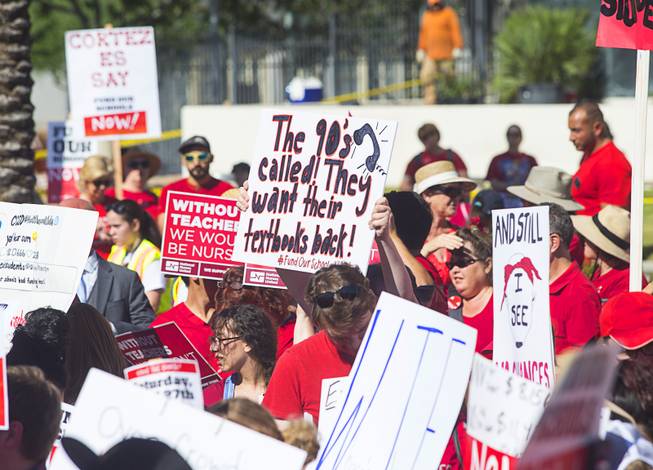
Miranda Alam/Special to the Sun
Attendees hold up signs during a rally held in support of more education funding by the Clark County Education Association at the Lloyd D. George U.S. Court House in Las Vegas on Saturday, April 27, 2019.
Sunday, May 26, 2019 | 2 a.m.
CARSON CITY — A proposal to let Nevada counties raise sales tax to pay for certain K-12 education issues is drawing concern from state’s only public policy think tank.
The Kenny Guinn Center for Policy Priorities released a report on Friday finding that a proposed amendment to Assembly Bill 309 allowing counties to implement a 0.25% sales tax would make Nevada more reliant on an “unstable and regressive” tax and create funding streams that could be unreliable. The tax would need to be approved by either a two-thirds majority of a county commission or by a majority vote in an election.
The bill’s amendment has received pushback from opponents, who call the taxes under the bill regressive, meaning they are applied uniformly and affect people who may not be able to afford further taxation.
The analysis, which agreed with this assessment, pointed out that sales taxes can be a victim of economic cycles, with revenue potentially decreasing as economic conditions fluctuate.
“This means that school districts could come to depend heavily on a somewhat unstable source of revenue,” the analysis read. “If districts estimate the sales tax collections for the upcoming year, but collections fall short of those estimates, school districts must find ways to cover the revenue shortfall. This could force districts to make budget cuts, even with increasing revenues.”
The analysis also concluded the amendment would not force the sales tax revenue to go toward education. Under the current form of the bill, the funding could be used to pay for some issues that are not related to education funding, including homelessness and affordable housing measures.
It also raised concerns about a section of the bill that would establish block grant funding for school districts, stating it may be another unreliable revenue stream due to restrictions on its use beyond the fiscal years for which it is granted.
“The bill explicitly states that the money received under this block grant ‘must not be budgeted by a school district or charter school in a manner that creates any obligation or deficit for funding in any fiscal year after the fiscal years for which the money was received,’” the analysis read. “This suggests that any salary increase funded by this block grant would only be temporary (or must be able to be funded with money outside the block grant after two years).”
Assembly Bill 309 was passed as amended through committee on Friday. As it is exempt from the standard deadlines, lawmakers will have an extra week to move the bill through the process.
